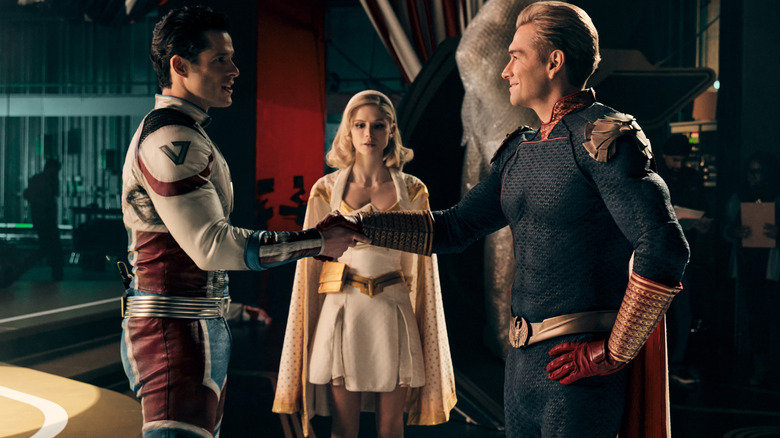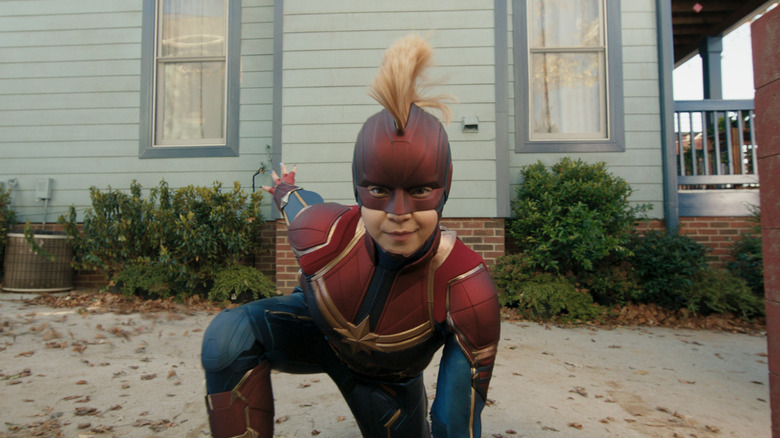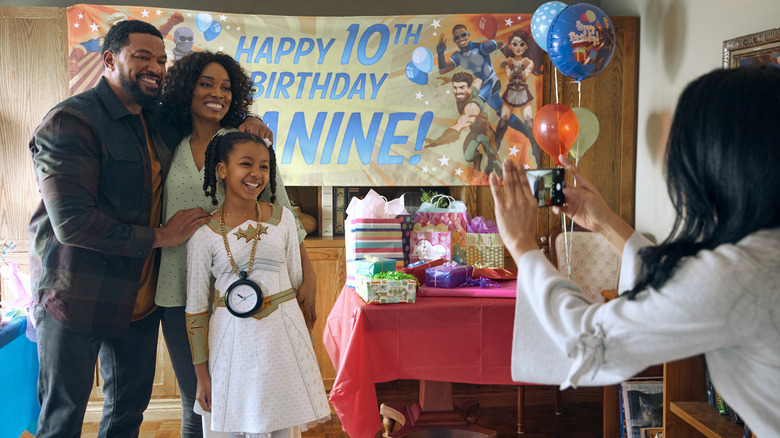Ms. Marvel And The Boys Are Having Two Very Different Conversations About Hero Worship
This post contains spoilers for the first episode of "Ms. Marvel" and the first three episodes of "The Boys" season 3.
Whenever a certain genre (or subgenre) of storytelling reaches another level of success entirely and becomes a widespread sensation, it's only a matter of time before more subversive rivals crop up and take aim squarely at their mainstream peers. Superheroes fit that bill perfectly, having positioned themselves as arguably the dominant pop culture force on the planet right now. Their blend of four-quadrant appeal, aspirational morals, and the uncomfortable power fantasy residing just below the surface makes this media uniquely positioned to comment on itself. For all the optimistic and simplistic stories in the comics, animation, and live-action, it seems like there are always more overtly meta-textual examples like "Watchmen" or "Invincible" just waiting for that chance to keep their more traditional brethren in check.
That's not to say that there's anything inherently superior about stories that exist only to serve as deconstructions, to be clear. As with any story of any genre, it all depends on the quality of the writing, the strength of the artist's vision, and whether the points being raised actually ring true or not. It's the difference between something like Zack Snyder's "Watchmen" movie, which lovingly recreates entire panels of the comic series but otherwise gets too wrapped up in worshipping the very "heroes" its meant to be critiquing, and Damon Lindelof's "Watchmen" series on HBO, which found a genuinely inspired way to move those flawed characters forward while remaining faithful to the spirit of the original work.
Now "Ms. Marvel" has burst onto the scene, and it serves as the embodiment of all the charms and inspiration and feel-good vibes that these characters have to offer. But thanks to a quirk of scheduling, season 3 of Prime Video's "The Boys" also happens to be airing at the same time ... and it's become impossible to ignore how both shows, existing on such polar opposite ends of the spectrum, have incredibly contrasting things to say about the exact same topic — hero worship.
Mixed messages
The very concept of hero worship is baked right into the premise of "Ms. Marvel." The premiere episode opens with a delightful animated sequence filtered through the always-daydreaming, rose-tinted eyes of Kamala Khan, breathlessly recapping the events of "Avengers: Endgame" as Earth's Mightiest Heroes successfully vanquish the threat of Thanos. Young Kamala, naturally, ends up an adoring fan of Captain Marvel and all the empowerment that the superhero represents from afar. But even setting aside the volatile matter of the character's solo movie taking the form of dictionary-definition military propaganda, such unthinking veneration of Marvel Studios' own IP can't help but feel ... uncomfortable.
Granted, this isn't even a new phenomenon in the MCU, though it might be the most bald-faced attempt at it. Similar to "Hawkeye," "Ms. Marvel" features a teenaged protagonist who looks up to one of the world-famous Avengers as if they were celebrities. Unlike that previous Disney+ series, however, Captain Marvel herself is nowhere to be seen in "Ms. Marvel." Carol Danvers hasn't received the same kind of morally complicated backstory that Clint Barton was burdened with, and therefore isn't given the same opportunity to confront her generational counterpart with the harsh reality that such unquestioning reverence is actually somewhat misplaced. Instead, Kamala's obsession with a figure who's only famous for killing aliens is treated as if it were an unambiguously positive character trait.
But is it? The "Ms. Marvel" premiere revolves around Kamala sneaking out to attend the most garish, in-universe celebration imaginable: AvengerCon (which Kevin Feige threatened could become a reality). Though Kamala's rebellion against her parents' wishes not to go is given proper weight and consequences, that's nonetheless where her first major act of superheroism takes place. As much as the script realizes that she needs to make amends with her parents, building to a confrontation with her mother, it's as if the show argues that the ends justify the means. After all, the episode still ends on a triumphant note as she flexes her "cosmic" powers and basks in her own power fantasy. Breaking the rules is okay as long as it results in superpowers, kids!
Though there's still plenty of time for the series to take a more nuanced approach, the early returns regarding this unabashed and unswerving lionization of superheroes aren't terribly encouraging.
On second thought...
"The Boys," meanwhile, begins on a note that's startlingly reminiscent of "Ms. Marvel" — but with a vastly different outcome in mind. Season 3 opens with the in-universe film "Dawn of the Seven" (itself a shameless piece of pro-Vought, pro-Seven propaganda), which whitewashes the events of last season and presents Homelander as if he had always been staunchly opposed to the Nazi Supe Stormfront. Pulling back to reveal that Homelander is watching this film at the world premiere along with hundreds of people absorbing the propaganda without a second thought, it quickly becomes clear that "The Boys" is tackling eerily similar themes about hero worship, but arriving at the conclusion that reality is far more complicated than the fantasies we'd much rather believe.
This idea has popped up again and again throughout the course of each season of "The Boys," but the three most recent episodes of the series have certainly turned up the dial with regards to the public image of superheroes. Take Voughtland in episode two, which immediately calls to mind the pageantry of AvengerCon, but with the self-awareness to acknowledge how absurd the Supe-themed park really is. Or consider the subplot concerning Mother's Milk and his daughter, Janine, who worships the ground the Seven walk on much the same way Kamala does with Captain Marvel. Amid all this, the Cameron Coleman show on Vought News Network, which functions as a thinly-veiled commentary on Fox News, repeatedly feeds the masses with carefully calculated PR entirely at odds with what we know about the actual Supes. One could easily imagine countless individuals, blissfully ignorant of Homelander's increasingly disturbing arc, building their very identity around superpowered celebrities who don't have anyone's best interests at heart.
Obviously, "The Boys" and "Ms. Marvel" are operating on two separate wavelengths with two extremely disparate target audiences in mind. No reasonable person would propose that Kamala Khan should suddenly become as jaded and cynical as Billy Butcher, or that "The Boys" is operating on a flawless level of storytelling simply because it has an edgier tone. What's unmistakable, however, is that one show presents its superhero worship as a matter of course. The other calls bulls*** on that fantasy and implores viewers to take a more critical approach.
Not every superhero story needs to be the same but, in the year 2022, maybe one is more preferable to the other.


